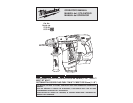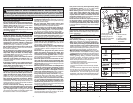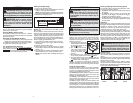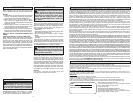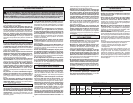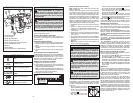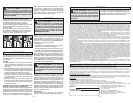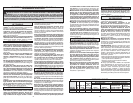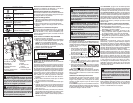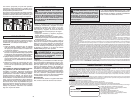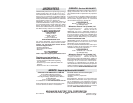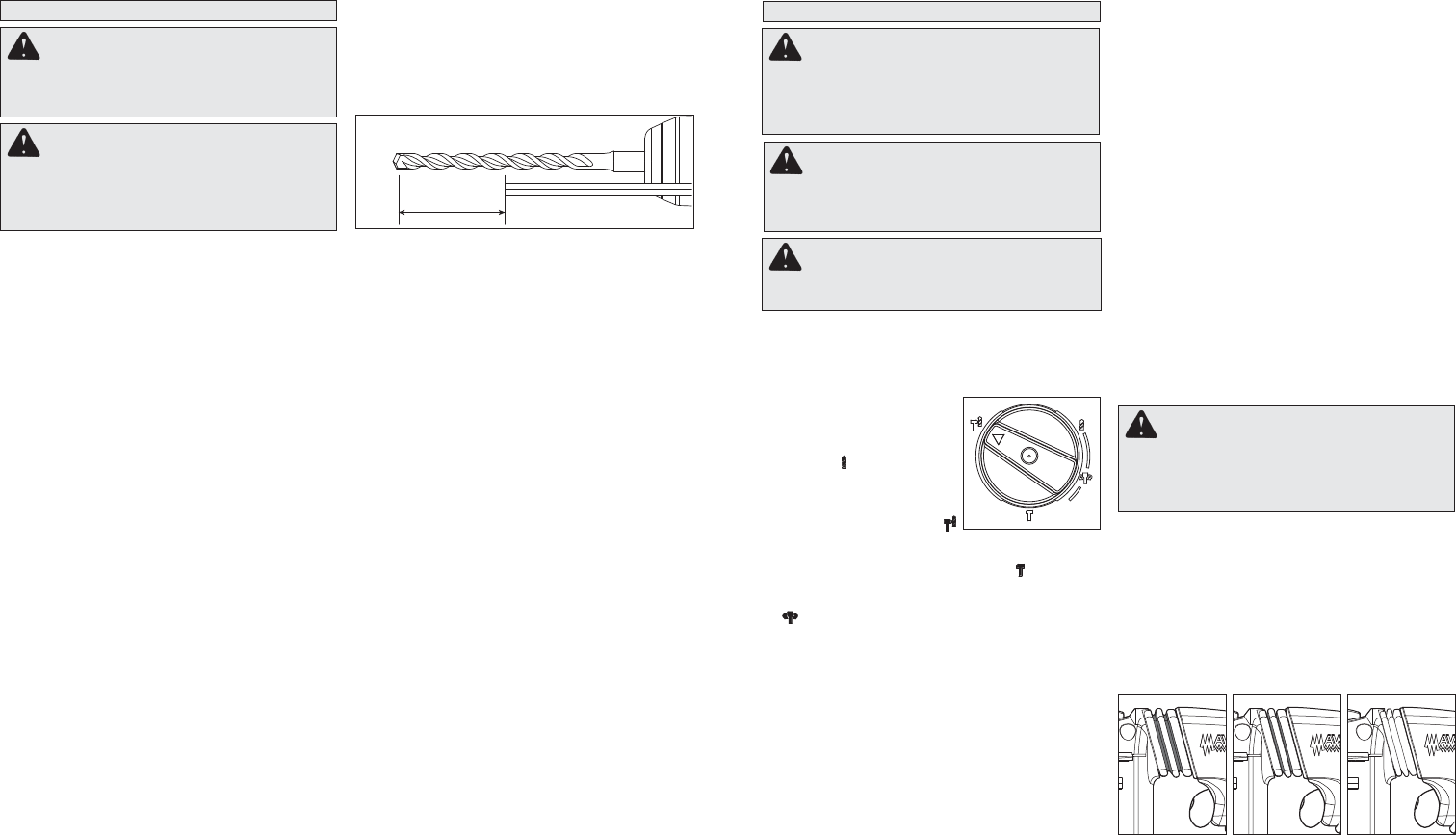
4
5
Fig. 1
Drilling Depth
Setting the Depth Gauge
1. Press in the clamping lever.
2. Slide the depth gauge rod backward or forward
until it is set for the desired depth.
NOTE: The drilling depth is the distance between
the tip of the bit and the tip of the depth gauge rod.
3. Release the clamping lever.
ASSEMBLY
WARNING Recharge only with the
charger specified for the battery. For spe-
cifi c charging instructions, read the operator’s
manual supplied with your charger and battery.
Removing Battery Pack from Tool
Push in the release buttons and pull the battery
pack away from the tool.
Inserting Battery Pack into Tool
To insert the battery pack onto the tool, slide the
pack onto the body of the tool. Make sure it latches
securely into place.
Adjusting the Side Handle Position
1. Loosen the side handle by unscrewing the side
handle grip until the side handle rotates freely.
2. Rotate the side handle to the desired position.
3. Tighten the side handle grip securely.
For use with the Dust Extractor
The Milwaukee Cat. No. 2715-DE Dust Extractor
plugs directly into these
1-1/8" SDS PLUS
1-1/8" SDS PLUS
Rotary
Rotary
Hammers.
Hammers. For Dust Extractor assembly and opera-
tion, refer to your Dust Extractor manual.
WARNING Always remove battery
pack before changing or removing acces-
sories. Only use accessories specifically
recommended for this tool. Others may be
hazardous.
Installing Drill Bits and Chisels
NOTE: Only use accessories with SDS or SDS
Plus shanks.
Be sure that the shank of the bit is clean. Dirt par-
ticles may cause the bit to line up improperly. Do not
use bits larger than the maximum recommended
capacity of the drill because gear damage or mo-
tor overloading may result. For best performance,
be sure that the bit is properly sharpened and the
shank is lightly greased before use.
1. Insert the bit or chisel into the nose of the tool.
2. Rotate bit slowly until it aligns with the locking
mechanism.
3. Push bit into tool until it locks.
4. Check that the bit is locked properly; it should
be possible to pull the bit back and forth slightly
(about 1/4").
5. To remove bits and chisels, pull bit holder release
collar toward the rear of tool and remove bit.
NOTE: Use caution when handling hot bits and
chisels.
Starting, Stopping and Controlling Speed
For operation when using the Dust Extractor, refer
to your Dust Extractor manual.
1. To start the tool, grasp the handle fi rmly and pull
the trigger.
2. To vary the speed, increase or decrease the
pressure on the trigger. The further the trigger
is pulled, the greater the speed.
3. To stop the tool, release the trigger. Make sure
the tool comes to a complete stop before laying
the tool down.
Operating
Position the tool, grasp the handles fi rmly and pull
the trigger. Always hold the tool securely using both
handles to maintain control. This tool has been
designed to achieve top performance with only
moderate pressure. Let the tool do the work.
If the speed begins to drop off when drilling large
or deep holes, pull the bit partially out of the hole
while the tool is running to help clear dust. Do not
use water to settle the dust since it will clog the bit
fl utes and tend to make the bit bind in the hole. If
the bit should bind, a built-in, non-adjustable slip
clutch prevents the bit from turning. If this occurs,
stop the tool, free the bit and begin again.
OPERATION
WARNING To reduce the risk of injury,
keep hands away from the bit and all moving
parts. Always wear safety goggles or glasses
with side shields.
Selecting Action
MILWAUKEE Rotary Hammers have three settings:
rotation only, rotary hammer, and hammer only.
Always allow the motor to come to a complete
stop before changing the mode selection to avoid
damage to the tool.
1. For rotation only, rotate the
mode selector so the arrow
on the lever points to the
twist drill symbol.
2. For rotary hammering,
rotate the mode selector
so the arrow points to the
hammer and twist drill
symbol.
3. For hammering only, rotate the mode selector
so the arrow points to the hammer symbol.
4. To freely rotate the bit to the desired angle for
hammering only, rotate the mode selector to the
symbol. Then, follow step 3.
NOTE: To engage the hammering mechanism,
maintain pressure on the bit. When pressure on
the bit is released, the hammering action will stop.
Using the Control Switch
The control switch may be set to three positions:
forward, reverse and lock. Always allow the motor
to come to a complete stop before using the control
switch to avoid damage to the tool.
For forward (clockwise) rotation, push in the control
switch from the right side of the tool. Check the
direction of rotation before use.
For reverse (counterclockwise) rotation, push in the
control switch from the left side of the tool. Check
direction of rotation before use.
To lock the trigger, push the control switch to the
center position. The trigger will not work while the
control switch is in the center locked position. Always
lock the trigger or remove the battery pack before
performing maintenance, changing accessories,
storing the tool and any time the tool is not in use.
WARNING Always remove battery
pack before changing or removing acces-
sories. Only use accessories specifically
recommended for this tool. Others may be
hazardous.
WARNING To reduce the risk of injury,
always use a side handle when using this tool.
Always brace or hold securely.
WARNING Applying greater pressure
does not increase the tool's effectiveness. If the
applied working pressure is too high, the shock
absorber will be pushed together making the
vibrations to the handle noticeably stronger.
Operator Force
The Anti-Vibration System provides the operator
with comfort without sacrifi cing power or perfor-
mance.
Ideal operator force compresses the bellows slightly
and allows the tool to work aggressively while the
handle remains steady.
Excessive force compresses the bellows signifi -
cantly and reduces vibration dampening. Users will
be able to feel the difference and should adjust the
force to the handle accordingly.
Too Little Correct Too much
force force force




